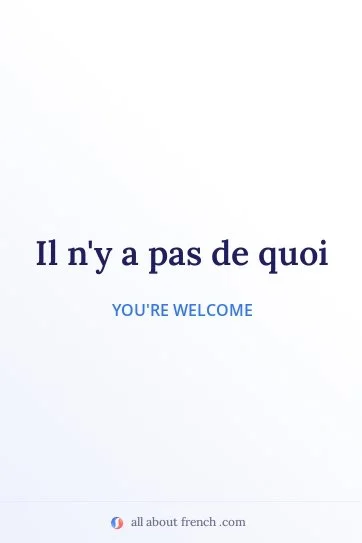
Are you ready to learn everything you need to know about the basic French phrase "Il n'y a pas de quoi"? To be more specific, it includes a detailed definition of what it is and how to use it in everyday life with an audio example. But wait, we also added useful informations like dialogue example, slow pronunciation audio, synonyms and more!
Translation : You're welcome
Register : Neutral - Basic
Slow
Normal
IPA : / il nj‿ a pa də kwa /

The literal meaning is: "There is nothing to thank me for / There is no reason to thank me"
In fact, "Il n'y a pas de quoi" and its shorter version "Pas de quoi" are used quite often in daily life and are some of the most popular ways to express "You are welcome" in French. The most classic way is "De rien", so if you have to keep in mind just one, use "De rien" which will work in every situation.
Let's see a few examples!
A very basic example: you do something for someone and the person says: "Merci" (Thank you). Then you answer: "De rien" (You are welcome) or "Avec plaisir" (My pleasure) or "Il n'y a pas de quoi" (No reason to thank me)
But now let's take the same situation and change it a little. The person who says "Merci" is your boss and you want to show some extra respect while saying "You are welcome", so you can use instead: "Avec plaisir" (With pleasure) or "Je vous en prie" ("I beg of you").
Another case: the person is now your sibling/family or a close friend. No need to be formal anymore, right? So you can use instead: "C'est rien" (That's nothing) or "Pas de quoi" (No reason to thank me) or "T'inquiète" (Don't worry) or "Pas de souci" (No worry).
Finally, imagine you think you don't deserve the "Thank you" or you think the other person is actually the one to thank. In this case you can use an expression to redirect the "Merci" toward the other person.
Examples: "C'est moi qui te remercie" → "No, I am the one who thank you" (Informal) or "C'est moi qui vous remercie" (Formal). Other options would be: "Tout le plaisir est pour moi" → "All the pleasure is for me" (Neutral) or "Merci à toi/vous" → "Thanks to you". (Informal/Formal)
Check the variations below to find the most appropriate ones regarding your situation!
In France, the variations you can use are:
In other French-speaking countries, you can also use:
Dialogue
Happy Mother's Day!
Merci, c'est gentil
Thank you, that's sweet
Il n'y a pas de quoi
You're welcome
Learn French with Audio Stories
Learn French the easy way with our French - English
parallel texts with slow French audio
 Start Learning
Start Learning 